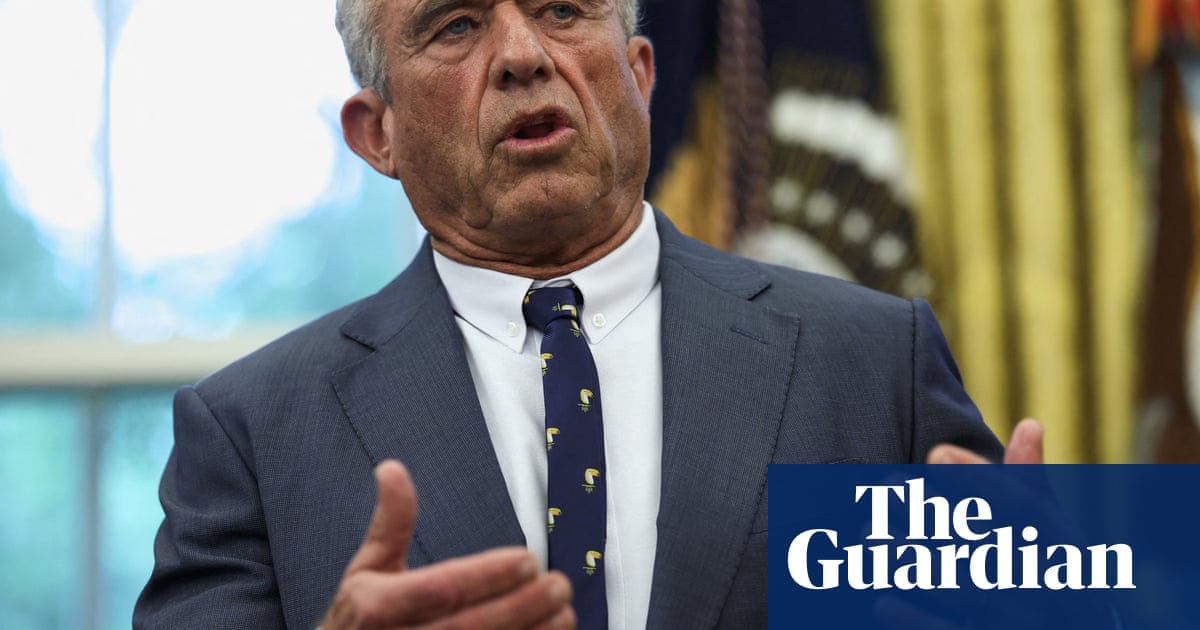Donald Trump’s health secretary and long-time vaccine skeptic,Robert F Kennedy Jr, presented ahighly anticipated reporton children’s health this week.
The “Maha commission” report, referring to the “Make America healthy again” movement, was required by a presidential executive order in February. The report focuses on chronic disease among children.
The 68-page report broadly summarizes five areas affecting children’s health, with a focus onultra-processed foods, environmental chemical exposure, lack of physical activity, “overmedicalization”, and “capture” of regulatory agencies.
It notably omits some of the most common causes of chronic disease and death in children, insinuates there could be harms where there is lack of evidence, and avoids discussing how Republicans have already changed the health system in ways researchers believe are harmful.
Art Caplan, a professor of bioethics at New York University’s Grossman School of Medicine, told the Guardian that the report has “interesting ideas about health and children’s health and crackpot fringe tin-hat-wearing nonsense – it’s got it all”.
Here are five of the key takeaways from the report.
The most common causes of death among children are car crashes and firearm accidents. The report ignores these issues, as well as behaviors that often start in adolescence and lead to chronic disease in adulthood, such as smoking and alcohol use. It also criticizes water fluoridation, without mentioning its protective effects against cavities.
Also, absent from the report is a discussion of how the administration has already changed the health department in ways that advocates argue will benefit industry and could exacerbate chronic disease.
For instance, Kennedy eliminated two smoking prevention offices at the Centers for Disease Control and Prevention (CDC) and the Food and Drug Administration (FDA) in what one former regulator toldStatwas “the greatest gift to the tobacco industry in the last half century”. He also eliminated a world-leadingsexually transmitted infectionlaboratory.
In another example, one of the nation’sleading researchersof ultra-processed foods quit his “dream job” after facing what he described as censorship from the administration (thehealth department reportedlyasked him to return). In a similar vein, the Trump administration cut a program thatdelivered local whole foodsto schools soon after taking office, in spite of Kennedy calling for healthier school meals.
The report is roughly broken up into five sections focusing on ultra-processed foods, environmental chemical exposures, children’s mental health, “overmedicalization” and “corporate capture” of regulators by the industries they are supposed to oversee.
Kennedy has harped on many of the issues listed in the report for months in public appearances and even though his defunct presidential campaign – especially including ultra-processed foods and obesity. Although some of these concerns may find bipartisan support – such as the focus on “forever chemicals” such as Pfas – it also pushes into areas where the science is unsettled.
For instance, the report mentions that high levels of fluoride are potentially associated with reduced IQ, but does not mention its well-established protective effects against cavities – the most common chronic condition in children, according to theNational Institute of Dental and Craniofacial Research.
Similarly, the report argues that the childhood vaccine schedule is causing concern among parents for,“their possible role in the growing childhood chronic disease crisis” – without citing evidence that vaccines are linked to any specific chronic disease.
Even before the report was published, congressional lawmakers were beingbombardedby calls from agricultural and chemical lobbyists wary of how the report would criticize their products – and indeed it did.
One of the report’s sections questions whether “crop protection tools” including “pesticides, herbicides and insecticides” could harm human health. It then specifically name-dropsglyphosate, the key ingredient in Roundup, andatrazine, a common herbicide. That is sure to make for strange political bedfellows and consternation within the Republican party. Similarly, the report cites synthetic dyes and ultra-processed foods are potentially harmful.
Chemicals and food additives have been issues of concern for decades on the left. However, the Maha movement has alsocatalyzed oppositionto them on the right.
The commission’s members are made up of the heads of intersecting agencies, including Kennedy at the Department of Health and Human Services, and the heads of the departments of agriculture, housing, education, veterans affairs and the Environmental Protection Agency, among others.
However, the exact authors of the report are unknown. This contrasts with Kennedy’s repeated promise at his confirmation hearing that his health department would practice “radical transparency”.
The work of the “Maha” commission wasreportedly spearheadedby senior Kennedy adviser Calley Means, a former food lobbyist and healthcare entrepreneur who rose to prominence as a Maha truth-teller. Means co-wrote a bestselling book with his sister, current US surgeon generalnomineeCasey Means, which blames many of America’s ills on sedentary lifestyle and poor diet.
One of the key issues the report identifies is the influence of food, pharmaceutical and chemical companies on American policy. They are monied and powerful.
As a result, getting real change through Congress is certain to be tough – especially in an administration devoted to reducing regulations.
